The Anima Mundi in All Cells
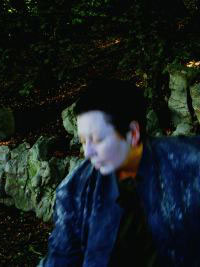 My friend My friend took me to a new place the other day and I knew I had to return. Something called. When I first arrived I thought, This would be a good place to die, to just let go and allow my spirit to find release, let my body dissolve into the earth. Something of that happened there this morning, though not as I expected...which is a good thing. I will try to explain:
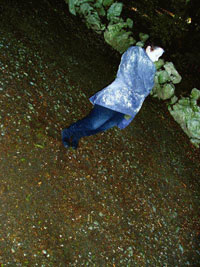 The challenge for me has been to let my rational, conscious awareness be as subsumed as possible by the impulses of the natural world: to surrender my own smaller needs. I realized this morning, however, that I no longer have enough intelligence to do this. (I would risk saying that at one point, maybe 25 years ago, this intelligence was stronger in me, but over the years the need to be someone has made me dull.) I have tried to make myself available to the natural world, but I have become so dense, so filled with data and thoughts and expectations, the natural world has a difficult time finding a way in.
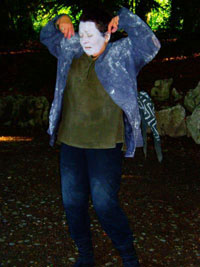 When I arrived this morning, I thought I would work on the "movement of dying." I had a plan, in other words. I would do this and this and this and then this...which is, of course no real dying at all. Fortunately, I found a way out of this folly or, better put, a way out found me. This place that had called was, indeed, a good place. Soon, I was emptied into its presence.
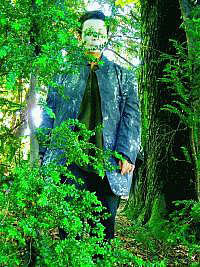 Standing in the midst of the trees, they found a way in. There was no longer "me" trying to move. For a grace-filled few moments, the trees were moving me, speaking a kinetic, wordless text. By grace again, "my plans" to die deceased. Through the earth and into my feet old roots and long memories filled my limbs. A tempest storm raged. Mute cries of outrage and tortured screams. Whose memories were these? Whose tempest storm? Were these the trees speaking, or were these my own flesh memories unearthed and uprooted?
I believe the only answer to this question is, Yes!:
The place of trees was speaking the same speaking in me.
Click here to view Image Gallery
LANDSCAPES OF THE SOUL April, May, June 2004 : Reflections and a Frame of Reference for Movement Exploration
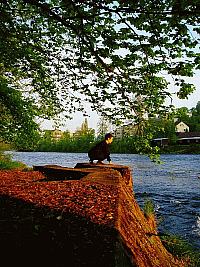 The following text was read at the beginning of one of the movement courses posted on this site. It was meant to bring an expanding awareness to the nature of movement, the body and the world. The following text was read at the beginning of one of the movement courses posted on this site. It was meant to bring an expanding awareness to the nature of movement, the body and the world.
How we conceive of ourselves, our bodies, and our bodies in time and space, define in part who and what we are. Down to the words and wording, to the languaging, is how we are determined and defined. How we move in the world, how we think, what we think, are influenced by how thought forms itself in the mind. If we think of ourselves, because of our languaging and our notions of reality, as an object moving through space in linear time, separate from other objects, then we set up an experience of object and subject with a limited understanding of time. We omit circular time, we omit eternal time, we omit the field in which all resides simultaneously and through which all is inextricably related. We omit zero, the void point, the absolute stillness out of which all arises.
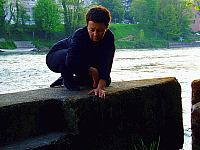 The movement work attempts to challenge the experience of subject and object as well as chronological, linear time. Rather than, "I am walking on the road," we shift and we have, "Roadwalking is happening." Rather than, "I am singing a song," we have, "There is singing going on."
We can take one step further and say, "The song is singing itself. The walking or movement is moving itself." In other words, the song and the movement are living beings. The movement we invite is a being that we honor with our attention and our surrender to its expression. We offer ourselves to the impulses of the unconscious, temporarily sacrificing ego desires.
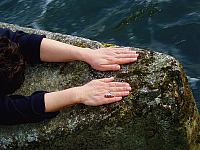 The more we conceive of the human body NOT as mechanistic, not as biological reactions, BUT as the physical manifestation of "fields of meaning" and "processes of knowledge," the more we will be open to subtle levels of energy, the subtle levels that are contained within the process of healing.
"[Physicist David] Bohm suggested that, in its deepest essence, reality, or "that which is," is not a collection of material objects in interaction but a process or a movement ... of the whole. This flowing movement throws out explicit forms that we recognize through our senses of sight, smell, hearing, taste, and touch. These explicate forms abide for a time and we take them as the direct evidence of a hard and fast reality. However, Bohm argues, this explicate order accounts for only a very small portion of reality; underlying it is a more extensive implicate ... order. 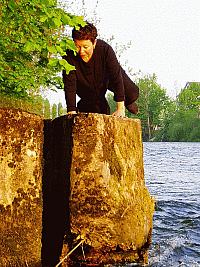 The stable forms we see around us are not primary in themselves but only the temporary unfolding of the underlying implicate order. To take rocks, trees, planets, or stars as the primary reality would be like assuming that the vortices in a river exist in their own right and are totally independent of the flowing river itself." (D. Peat, 1996, p140)
The knowledge or insight gained in this process is yours. It resides and springs from deep within. Once the experience is felt, it cannot be taken away. At the same time, you are the only person who can give the experience and the ensuing insight to yourself, by commitment to the process, by removing the critic, by dropping small mind and letting your body become your field of perception. This takes practice, and it is practice that this work helps to provide.
Click here to view Image Gallery
Moving in the Bardos
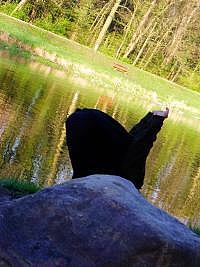 As you may have noticed on the Courses page of this website, I offer workshops in movement. This work has evolved out of a 30 year inquiry into the body. I am fortunate to have studied with some very fine teachers, some known and some unknown, either in classes or in long years of private, collaborative research. Each teacher and colleague has been an original pioneer, offering a crucible of discovery by way of their excursions into the unknown. 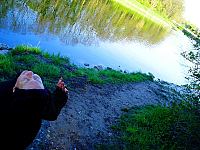 When I started a few years ago to offer my own courses on a formal basis, I saw very quickly how imperative it is to keep the work alive by direct and sustained participation in the process, either with a teacher or colleague or through self-designed inquiry. I believe we must find a way to feed ourselves if we are to help feed others. Otherwise, we soon starve. This spring, I realized I was starving and had to find a way to sustenance. After considerable thought, I knew I needed to do something that was immediate, alive, flexible, related to the organic, natural world. Taking my cue from Min Tinaka, Japanese Butoh dancer and teacher, I decided to go walking in the early morning to see what movement would arise spontaneously, just letting myself be formed and moved by any impulses I might experience while in nature. I mentioned this to a friend of mine who offered their support by sometimes walking with me and sometimes taking photos. 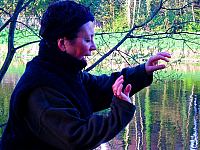 These first inquiries have taken shape by getting up at 5:30 in the morning and walking by the Limmat, the river that flows out of the Lake of Zurich, through the city of Zurich, and on towards Baden. I had great expectations for myself, for the project. But I soon learned that the expectations bowed to "a lesser god," one of small moves and gradual, imperceptible changes. Just getting up at that hour was a commitment of great effort: I was used to ending my day at 2 or 3 in the morning. At 5:30, my body was more like a piece of lead than anything mutable and receptive. I soon realized that just showing up, and letting myself feel all 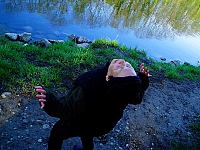 the resistance and discomfort it felt, was the exercise. Simplicity, humility, patience. Maybe, just maybe, I would be able to perceive something of the nature of river, stone and tree in the tiny quivers of cellular recognition and corporal mutuality. There have been micro-seconds of this recognition. There have even been spontaneous arrivals of birds, according to my friend. Watching, according to my friend. Sometimes it really is only these precious micro-seconds of genuine receptivity to life that we are granted. Perhaps we can learn, with patience, humility and an open heart, to let the seconds move into moments... Click here to view Image Gallery
|
|
Image Galleries
The following contain larger versions of images posted on these pages and are keyed to corresponding Reflections posts.
(Photos: Paul Anton Zorn)
|
 My friend took me to a new place the other day and I knew I had to return. Something called. When I first arrived I thought, This would be a good place to die, to just let go and allow my spirit to find release, let my body dissolve into the earth. Something of that happened there this morning, though not as I expected...which is a good thing. I will try to explain:
My friend took me to a new place the other day and I knew I had to return. Something called. When I first arrived I thought, This would be a good place to die, to just let go and allow my spirit to find release, let my body dissolve into the earth. Something of that happened there this morning, though not as I expected...which is a good thing. I will try to explain:
 The challenge for me has been to let my rational, conscious awareness be as subsumed as possible by the impulses of the natural world: to surrender my own smaller needs. I realized this morning, however, that I no longer have enough intelligence to do this. (I would risk saying that at one point, maybe 25 years ago, this intelligence was stronger in me, but over the years the need to be someone has made me dull.) I have tried to make myself available to the natural world, but I have become so dense, so filled with data and thoughts and expectations, the natural world has a difficult time finding a way in.
The challenge for me has been to let my rational, conscious awareness be as subsumed as possible by the impulses of the natural world: to surrender my own smaller needs. I realized this morning, however, that I no longer have enough intelligence to do this. (I would risk saying that at one point, maybe 25 years ago, this intelligence was stronger in me, but over the years the need to be someone has made me dull.) I have tried to make myself available to the natural world, but I have become so dense, so filled with data and thoughts and expectations, the natural world has a difficult time finding a way in.
 When I arrived this morning, I thought I would work on the "movement of dying." I had a plan, in other words. I would do this and this and this and then this...which is, of course no real dying at all. Fortunately, I found a way out of this folly or, better put, a way out found me. This place that had called was, indeed, a good place. Soon, I was emptied into its presence.
When I arrived this morning, I thought I would work on the "movement of dying." I had a plan, in other words. I would do this and this and this and then this...which is, of course no real dying at all. Fortunately, I found a way out of this folly or, better put, a way out found me. This place that had called was, indeed, a good place. Soon, I was emptied into its presence.
 Standing in the midst of the trees, they found a way in. There was no longer "me" trying to move. For a grace-filled few moments, the trees were moving me, speaking a kinetic, wordless text. By grace again, "my plans" to die deceased. Through the earth and into my feet old roots and long memories filled my limbs. A tempest storm raged. Mute cries of outrage and tortured screams. Whose memories were these? Whose tempest storm? Were these the trees speaking, or were these my own flesh memories unearthed and uprooted?
Standing in the midst of the trees, they found a way in. There was no longer "me" trying to move. For a grace-filled few moments, the trees were moving me, speaking a kinetic, wordless text. By grace again, "my plans" to die deceased. Through the earth and into my feet old roots and long memories filled my limbs. A tempest storm raged. Mute cries of outrage and tortured screams. Whose memories were these? Whose tempest storm? Were these the trees speaking, or were these my own flesh memories unearthed and uprooted?

 The following text was read at the beginning of one of the movement courses posted on this site. It was meant to bring an expanding awareness to the nature of movement, the body and the world.
The following text was read at the beginning of one of the movement courses posted on this site. It was meant to bring an expanding awareness to the nature of movement, the body and the world.
 The movement work attempts to challenge the experience of subject and object as well as chronological, linear time. Rather than, "I am walking on the road," we shift and we have, "Roadwalking is happening." Rather than, "I am singing a song," we have, "There is singing going on."
The movement work attempts to challenge the experience of subject and object as well as chronological, linear time. Rather than, "I am walking on the road," we shift and we have, "Roadwalking is happening." Rather than, "I am singing a song," we have, "There is singing going on."
 The more we conceive of the human body NOT as mechanistic, not as biological reactions, BUT as the physical manifestation of "fields of meaning" and "processes of knowledge," the more we will be open to subtle levels of energy, the subtle levels that are contained within the process of healing.
The more we conceive of the human body NOT as mechanistic, not as biological reactions, BUT as the physical manifestation of "fields of meaning" and "processes of knowledge," the more we will be open to subtle levels of energy, the subtle levels that are contained within the process of healing.
 The stable forms we see around us are not primary in themselves but only the temporary unfolding of the underlying implicate order. To take rocks, trees, planets, or stars as the primary reality would be like assuming that the vortices in a river exist in their own right and are totally independent of the flowing river itself." (D. Peat, 1996, p140)
The stable forms we see around us are not primary in themselves but only the temporary unfolding of the underlying implicate order. To take rocks, trees, planets, or stars as the primary reality would be like assuming that the vortices in a river exist in their own right and are totally independent of the flowing river itself." (D. Peat, 1996, p140)
 As you may have noticed on the Courses page of this website, I offer workshops in movement. This work has evolved out of a 30 year inquiry into the body. I am fortunate to have studied with some very fine teachers, some known and some unknown, either in classes or in long years of private, collaborative research. Each teacher and colleague has been an original pioneer, offering a crucible of discovery by way of their excursions into the unknown.
As you may have noticed on the Courses page of this website, I offer workshops in movement. This work has evolved out of a 30 year inquiry into the body. I am fortunate to have studied with some very fine teachers, some known and some unknown, either in classes or in long years of private, collaborative research. Each teacher and colleague has been an original pioneer, offering a crucible of discovery by way of their excursions into the unknown.  When I started a few years ago to offer my own courses on a formal basis, I saw very quickly how imperative it is to keep the work alive by direct and sustained participation in the process, either with a teacher or colleague or through self-designed inquiry. I believe we must find a way to feed ourselves if we are to help feed others. Otherwise, we soon starve.
When I started a few years ago to offer my own courses on a formal basis, I saw very quickly how imperative it is to keep the work alive by direct and sustained participation in the process, either with a teacher or colleague or through self-designed inquiry. I believe we must find a way to feed ourselves if we are to help feed others. Otherwise, we soon starve.  These first inquiries have taken shape by getting up at 5:30 in the morning and walking by the Limmat, the river that flows out of the Lake of Zurich, through the city of Zurich, and on towards Baden.
These first inquiries have taken shape by getting up at 5:30 in the morning and walking by the Limmat, the river that flows out of the Lake of Zurich, through the city of Zurich, and on towards Baden.  the resistance and discomfort it felt, was the exercise. Simplicity, humility, patience. Maybe, just maybe, I would be able to perceive something of the nature of river, stone and tree in the tiny quivers of cellular recognition and corporal mutuality.
the resistance and discomfort it felt, was the exercise. Simplicity, humility, patience. Maybe, just maybe, I would be able to perceive something of the nature of river, stone and tree in the tiny quivers of cellular recognition and corporal mutuality.